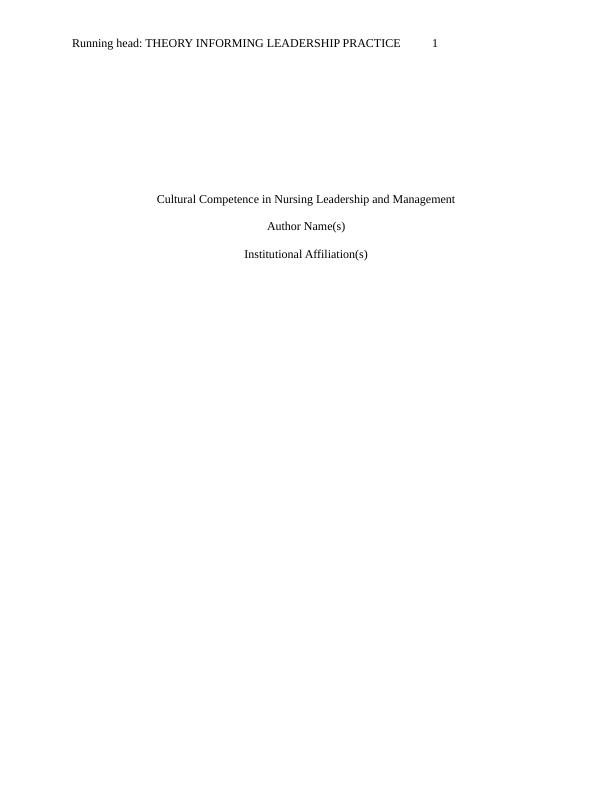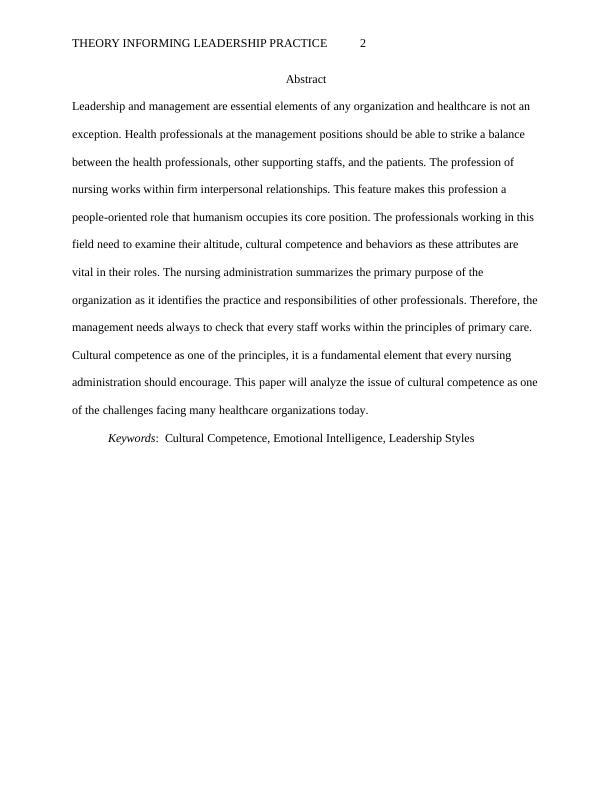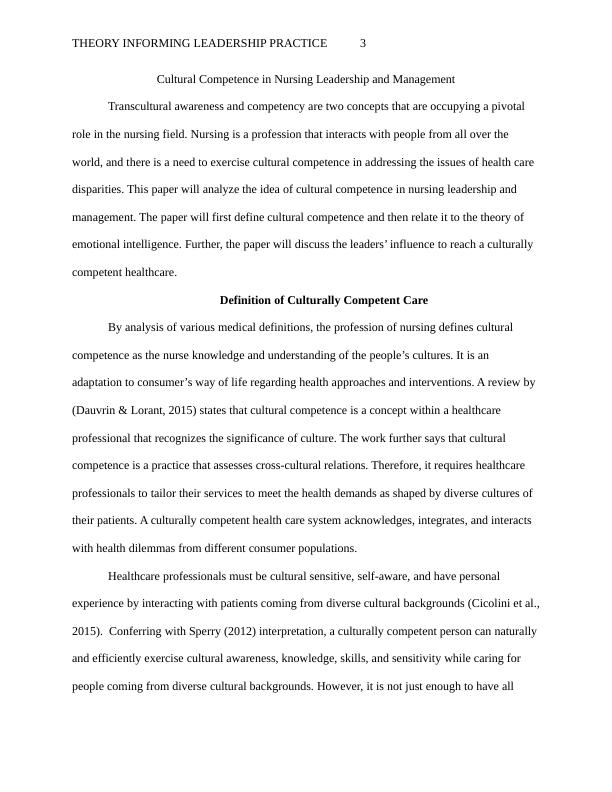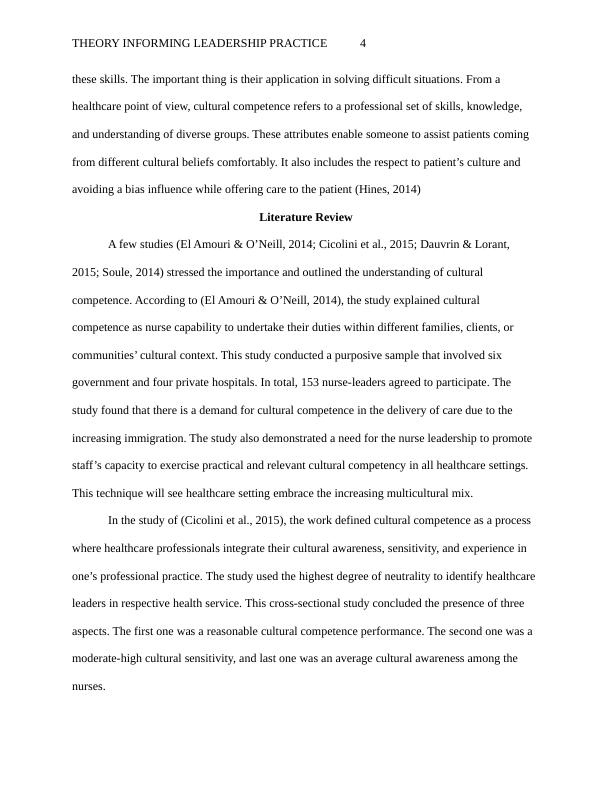Paper on Nursing Leadership and Management
16 Pages4837 Words79 Views
Added on 2020-05-04
Paper on Nursing Leadership and Management
Added on 2020-05-04
ShareRelated Documents
Running head: THEORY INFORMING LEADERSHIP PRACTICE1Cultural Competence in Nursing Leadership and Management Author Name(s)Institutional Affiliation(s)

THEORY INFORMING LEADERSHIP PRACTICE2AbstractLeadership and management are essential elements of any organization and healthcare is not an exception. Health professionals at the management positions should be able to strike a balance between the health professionals, other supporting staffs, and the patients. The profession of nursing works within firm interpersonal relationships. This feature makes this profession a people-oriented role that humanism occupies its core position. The professionals working in this field need to examine their altitude, cultural competence and behaviors as these attributes are vital in their roles. The nursing administration summarizes the primary purpose of the organization as it identifies the practice and responsibilities of other professionals. Therefore, themanagement needs always to check that every staff works within the principles of primary care. Cultural competence as one of the principles, it is a fundamental element that every nursing administration should encourage. This paper will analyze the issue of cultural competence as oneof the challenges facing many healthcare organizations today. Keywords: Cultural Competence, Emotional Intelligence, Leadership Styles

THEORY INFORMING LEADERSHIP PRACTICE3Cultural Competence in Nursing Leadership and ManagementTranscultural awareness and competency are two concepts that are occupying a pivotal role in the nursing field. Nursing is a profession that interacts with people from all over the world, and there is a need to exercise cultural competence in addressing the issues of health care disparities. This paper will analyze the idea of cultural competence in nursing leadership and management. The paper will first define cultural competence and then relate it to the theory of emotional intelligence. Further, the paper will discuss the leaders’ influence to reach a culturally competent healthcare. Definition of Culturally Competent CareBy analysis of various medical definitions, the profession of nursing defines cultural competence as the nurse knowledge and understanding of the people’s cultures. It is an adaptation to consumer’s way of life regarding health approaches and interventions. A review by (Dauvrin & Lorant, 2015) states that cultural competence is a concept within a healthcare professional that recognizes the significance of culture. The work further says that cultural competence is a practice that assesses cross-cultural relations. Therefore, it requires healthcare professionals to tailor their services to meet the health demands as shaped by diverse cultures of their patients. A culturally competent health care system acknowledges, integrates, and interacts with health dilemmas from different consumer populations. Healthcare professionals must be cultural sensitive, self-aware, and have personal experience by interacting with patients coming from diverse cultural backgrounds (Cicolini et al.,2015). Conferring with Sperry (2012) interpretation, a culturally competent person can naturallyand efficiently exercise cultural awareness, knowledge, skills, and sensitivity while caring for people coming from diverse cultural backgrounds. However, it is not just enough to have all

THEORY INFORMING LEADERSHIP PRACTICE4these skills. The important thing is their application in solving difficult situations. From a healthcare point of view, cultural competence refers to a professional set of skills, knowledge, and understanding of diverse groups. These attributes enable someone to assist patients coming from different cultural beliefs comfortably. It also includes the respect to patient’s culture and avoiding a bias influence while offering care to the patient (Hines, 2014) Literature ReviewA few studies (El Amouri & O’Neill, 2014; Cicolini et al., 2015; Dauvrin & Lorant, 2015; Soule, 2014) stressed the importance and outlined the understanding of cultural competence. According to (El Amouri & O’Neill, 2014), the study explained cultural competence as nurse capability to undertake their duties within different families, clients, or communities’ cultural context. This study conducted a purposive sample that involved six government and four private hospitals. In total, 153 nurse-leaders agreed to participate. The study found that there is a demand for cultural competence in the delivery of care due to the increasing immigration. The study also demonstrated a need for the nurse leadership to promote staff’s capacity to exercise practical and relevant cultural competency in all healthcare settings. This technique will see healthcare setting embrace the increasing multicultural mix.In the study of (Cicolini et al., 2015), the work defined cultural competence as a process where healthcare professionals integrate their cultural awareness, sensitivity, and experience in one’s professional practice. The study used the highest degree of neutrality to identify healthcare leaders in respective health service. This cross-sectional study concluded the presence of three aspects. The first one was a reasonable cultural competence performance. The second one was a moderate-high cultural sensitivity, and last one was an average cultural awareness among the nurses.

End of preview
Want to access all the pages? Upload your documents or become a member.
Related Documents
Nursing Assignment- Emotional Intelligencelg...
|6
|1206
|76
The Importance of Emotional Intelligence in Nursinglg...
|10
|2658
|58
ASSIGNMENT ON THE PURNELL MODELlg...
|7
|1152
|19
Leadership in nursing - Assignment PDFlg...
|10
|2351
|100
Culture in Mental Health Care Nursing Professionlg...
|10
|551
|96
Nursing and Knowledgelg...
|9
|2607
|405
